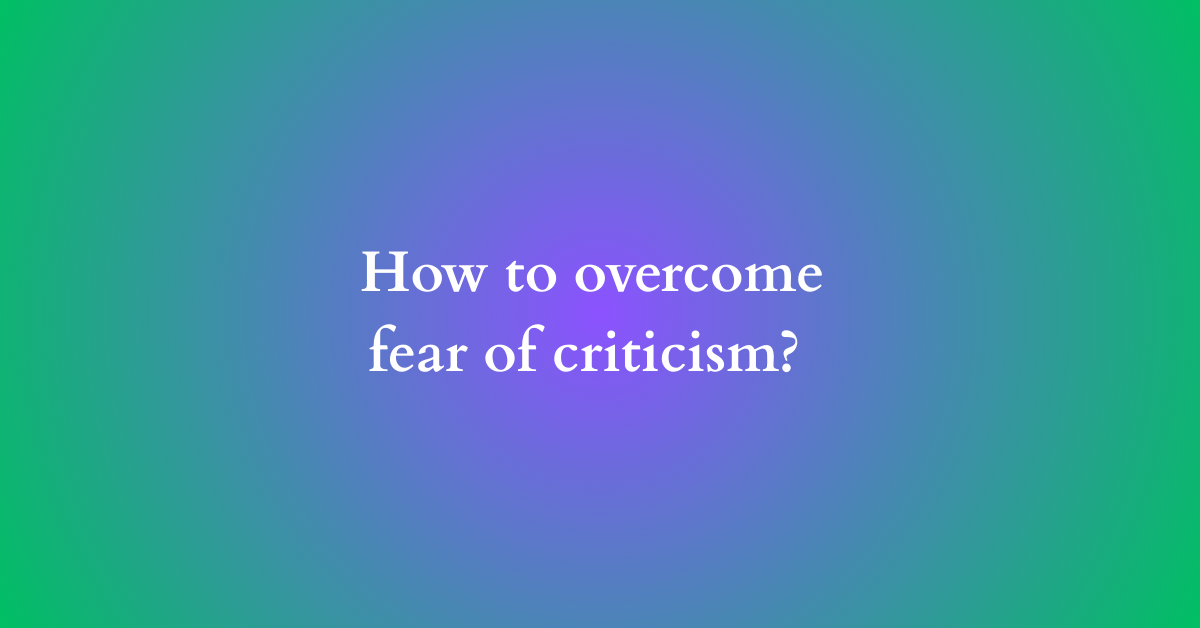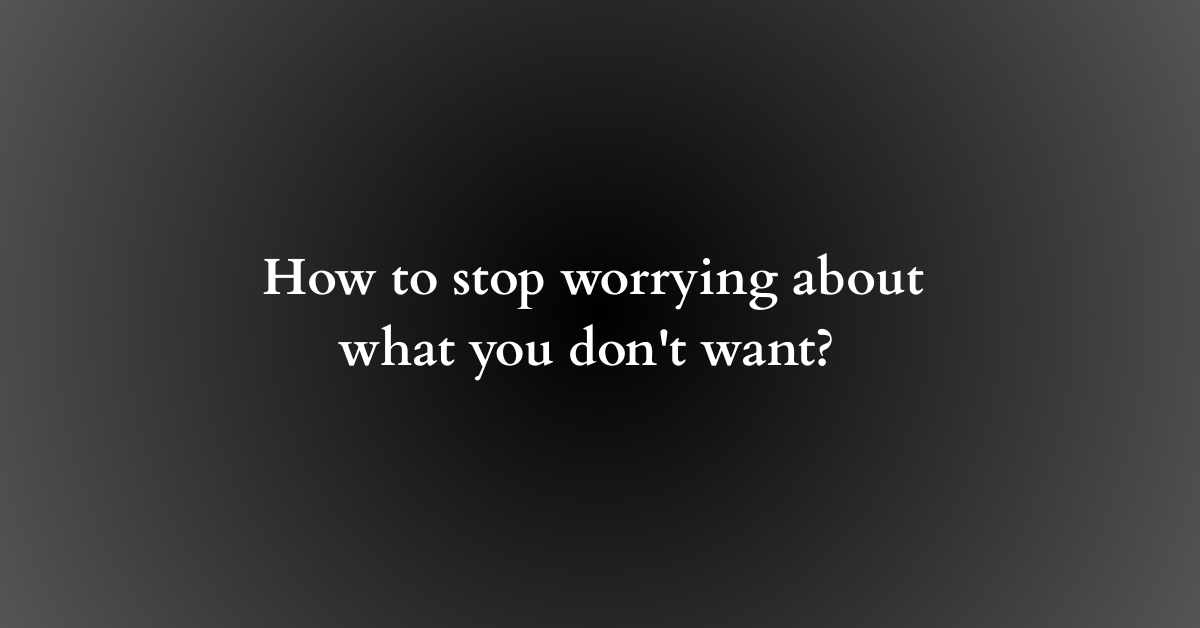Embracing Vulnerability: A Guide to Overcoming the Fear of Criticism
Criticism. The word alone can evoke a visceral reaction, a tightening in the chest, a rush of defensiveness. For many, the fear of receiving criticism, whether constructive or destructive, can be paralyzing, stifling creativity, hindering personal growth, and even impacting professional success. It’s a fear deeply rooted in our primal desire for acceptance and our vulnerability to feeling inadequate. However, understanding the origins of this fear and developing practical strategies to manage it is crucial for unlocking our full potential and building resilience.
This post aims to provide a comprehensive guide to understanding and overcoming the fear of criticism. We will delve into the psychological underpinnings of this fear, explore different types of criticism, and offer actionable steps to cultivate a healthier relationship with feedback, ultimately transforming it from a source of dread to a catalyst for growth.

Understanding the Roots of the Fear:
The fear of criticism is often intertwined with several underlying psychological factors:
- Need for Approval: Humans are social creatures, and a desire for acceptance and belonging is deeply ingrained. As children, we often seek approval from parents, teachers, and peers, associating it with love, security, and social inclusion. When this need becomes excessive, it can lead to a chronic fear of displeasing others and a debilitating aversion to criticism.
- Fear of Failure: Criticism can feel like confirmation of our inadequacies and reinforce the belief that we are not good enough. This fear of failure can stem from perfectionistic tendencies, high self-expectations, or past experiences of harsh judgment. We might avoid taking risks or sharing our work to protect ourselves from the potential pain of negative feedback.
- Low Self-Esteem: Individuals with low self-esteem often internalize criticism and view it as further evidence of their shortcomings. They may struggle to differentiate between valid feedback and personal attacks, leading to self-doubt and a diminished sense of worth.
- Past Trauma: Past experiences of bullying, abuse, or overly critical environments can leave lasting emotional scars and create a heightened sensitivity to criticism. These individuals may develop a hypervigilance to potential threats and react defensively even to well-intentioned feedback.
- Ego Investment: When we are deeply invested in our ideas, projects, or identities, criticism can feel like a direct assault on our sense of self. We may become overly attached to our creations and struggle to detach ourselves emotionally from the feedback we receive.
Dissecting Criticism: Not All Feedback is Created Equal:
Before we can effectively manage our fear of criticism, it’s important to distinguish between different types of feedback:
- Constructive Criticism: This type of criticism is delivered with the intention of helping us improve. It’s specific, actionable, and focuses on the behavior or output rather than the person. Constructive criticism is often framed positively and offers suggestions for improvement.
- Destructive Criticism: This type of criticism is often delivered with malice or a lack of empathy. It’s vague, personal, and often focuses on tearing down the individual rather than offering helpful suggestions. Destructive criticism can be hurtful and demotivating.
- Unsolicited Criticism: This is feedback that is offered without being requested. While unsolicited criticism can sometimes be helpful, it’s often delivered without context or understanding of the situation, making it difficult to process effectively.
- Internal Criticism: This is the critical voice within our own heads. It can be a harsh and unforgiving judge, constantly pointing out our flaws and shortcomings. Managing our internal critic is crucial for building self-compassion and resilience.
Strategies for Overcoming the Fear of Criticism:
Overcoming the fear of criticism is a process that requires self-awareness, conscious effort, and a commitment to personal growth. Here are some actionable strategies you can implement:
- Challenge Your Negative Thoughts: When you receive criticism, pay attention to the thoughts that arise in your mind. Are you immediately jumping to conclusions about your inadequacy? Are you engaging in negative self-talk? Challenge these thoughts by asking yourself: Is this thought based on facts or assumptions? Is there another way to interpret this feedback? What evidence supports this thought?
- Reframe Criticism as Feedback: Shift your perspective from viewing criticism as a personal attack to seeing it as valuable feedback that can help you improve. Remind yourself that feedback is an opportunity to learn and grow, even if it’s uncomfortable.
- Practice Self-Compassion: Be kind to yourself when you receive criticism. Acknowledge that everyone makes mistakes and that it’s okay to not be perfect. Treat yourself with the same compassion and understanding you would offer a friend in a similar situation.
- Focus on Controllable Factors: When you receive feedback, focus on the aspects that you can control. You can’t control what other people think or say, but you can control how you respond to their feedback. Identify specific actions you can take to address the issues raised and improve your performance.
- Seek Clarification: Don’t be afraid to ask for clarification if you don’t understand the feedback you’ve received. Ask specific questions to gain a better understanding of the concerns and to ensure that you’re on the same page.
- Learn to Discern Good Criticism from Bad: Not all criticism is created equal. Learn to distinguish between constructive feedback that can help you improve and destructive criticism that is intended to tear you down. Discard the latter and focus on incorporating the former.
- Develop a Thick Skin: While it’s important to be open to feedback, it’s also important to develop a sense of resilience and not take criticism too personally. Remember that criticism is often a reflection of the other person’s perspective, not necessarily a reflection of your worth.
- Practice Receiving Feedback in Small Doses: Start by seeking feedback on smaller, less emotionally charged projects. This will help you build your tolerance for criticism and develop coping mechanisms for managing negative emotions.
- Surround Yourself with Supportive People: Seek out friends, family members, or mentors who are supportive and encouraging. These individuals can provide a safe space for you to process feedback and offer valuable perspective.
- Focus on Your Strengths: When you receive criticism, it’s easy to dwell on your weaknesses. However, it’s important to remember your strengths and accomplishments. Remind yourself of your past successes and focus on building on your existing skills.
- Embrace Vulnerability: Allow yourself to be seen and heard, even if it means risking criticism. Embrace your imperfections and accept that you’re not always going to get things right. Vulnerability is a sign of strength, not weakness.
- Set Boundaries: It’s okay to set boundaries with people who consistently deliver destructive criticism. You have the right to protect your mental and emotional well-being. Politely decline to engage in conversations that are likely to be hurtful or unproductive.
- Seek Professional Help: If you’re struggling to overcome your fear of criticism on your own, consider seeking professional help from a therapist or counselor. A therapist can help you identify the underlying causes of your fear and develop coping mechanisms for managing your emotions.
Turning Criticism into a Catalyst for Growth:
Ultimately, overcoming the fear of criticism is about reframing your relationship with feedback. Instead of viewing criticism as a threat, see it as an opportunity for growth and self-improvement. By embracing vulnerability, developing self-compassion, and learning to discern good criticism from bad, you can transform your fear into a powerful motivator for achieving your goals and reaching your full potential.
Remember, the journey towards overcoming the fear of criticism is a marathon, not a sprint. Be patient with yourself, celebrate your progress, and never stop learning and growing. The rewards of embracing vulnerability and cultivating a healthy relationship with feedback are well worth the effort.







